
Filippo Cavarozzi was an Italian Mannerist painter of the Baroque period, active mainly in Viterbo.

Filippo Cavarozzi was an Italian Mannerist painter of the Baroque period, active mainly in Viterbo.

One source attributes his training to Giuseppe d'Arpino. He was apparently nicknamed The Spaniard. he painted an altarpiece depicting a Madonna and Child with Angels and Saints for Sant'Angelo in Spatha. He painted the wall frescoes for the chapel of the Palazzo dei Priori. He painted an altarpiece depicting the Assumption of the Virgin for the church of Santi Faustino e Giovita. He painted the Pentecost for the church of San Biagio. he painted a Mary Magdalen for the Confraternity of the same name. Along with Giuseppe d'Arpino, he painted an altarpiece depicting a Crucifixion with St Jerome and the Lion for the church of San Rocco. [1]

Sebastiano Conca was an Italian painter.

Santa Maria in Vallicella, also called Chiesa Nuova, is a church in Rome, Italy, which today faces onto the main thoroughfare of the Corso Vittorio Emanuele and the corner of Via della Chiesa Nuova. It is the principal church of the Oratorians, a religious congregation of secular priests, founded by St Philip Neri in 1561 at a time in the 16th century when the Counter Reformation saw the emergence of a number of new religious institutes such as the Jesuits, the Theatines, and the Barnabites. These new congregations were responsible for several great preaching churches built in the Centro Storico, the others being Sant'Andrea della Valle (Theatines), San Carlo ai Catinari (Barnabites), and The Gesù and Sant'Ignazio (Jesuits).

Pier Francesco Mazzucchelli was an Italian painter and draughtsman who was active in Milan. He is mainly known for his altarpieces, but his outstanding achievements are large decorative frescoes for the Sacro Monte di Varese and the Sacro Monte di Varallo.
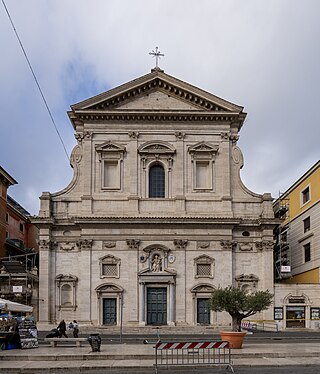
The Church of Santa Maria del Carmelo in Traspontina is a Roman Catholic titular church in Rome, run by the Carmelites. The bridge referred to is the Ponte Sant'Angelo. The church is on the Via della Conciliazione, the primary road of the Roman Rione of Borgo.

Sant'Onofrio al Gianicolo is a titular church in Trastevere, Rome. It is the official church of the papal order of knighthood Order of the Holy Sepulchre. A side chapel is dedicated to the Order and a former grand master, Nicola Canali is entombed there. It is located on the Janiculum. Since 1946, the church has been under the care of the American congregation of the Franciscan Friars of the Atonement.
Francesco Fernandi (1679–1740), also known as Imperiali, was an Italian painter of the late-Baroque or Rococo period.
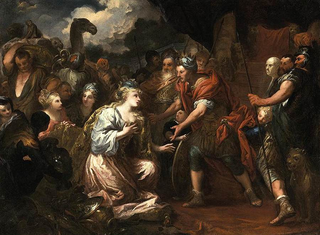
Pietro Dandini was an Italian painter of the Baroque period, active mainly in Florence.
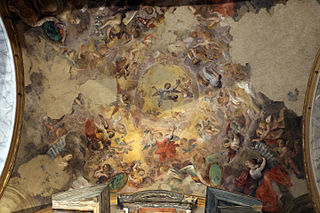
Francesco Allegrini da Gubbio (1587–1663) was an Italian painter of the Baroque period. His children, Flaminio and Angelica Allegrini, were also painters. Angelica painted a canvas for the church of San Francesco, Gubbio.

Giuseppe Pedretti was an Italian painter of the late-Baroque or Rococo period, active mainly in Bologna.
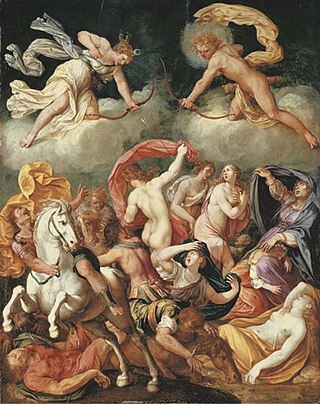
Bernardino Cesari was an Italian painter of the late-Mannerist and early Baroque period, active mainly in Rome and Naples, where he assisted his brother Giuseppe Cesari.

Giuseppe Tortelli was an Italian painter of the late Baroque period, active in Brescia.

The Church of Saint Lucy in Selci is an ancient Roman Catholic church, located in Rome, dedicated to Saint Lucy, a 4th-century virgin and martyr.

The Chiesa della Santissima Trinità dei Pellegrini is a Roman Catholic church located on Via dei Pettinari #36 In the rione of Regola of central Rome, Italy. It stands a block away from the Palazzo Spada on Via Capo di Ferro, while a few blocks away on the Via dei Pettinari stands the Ponte Sisto.

The Royal Chapel of the Treasure of St. Januarius, or the Reale cappella del Tesoro di San Gennaro, is a chapel located in the Cathedral of Naples, Italy, and dedicated to St. Januarius, patron saint of the city. This is the most lavishly decorated chapel in the cathedral, and contains contributions by the premier Baroque artists in Naples.
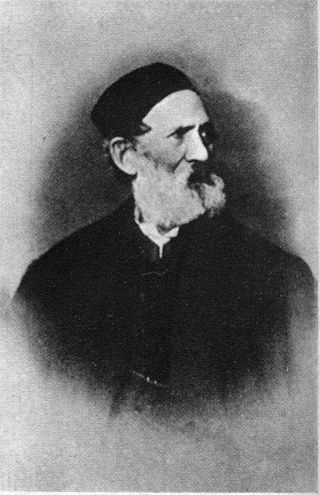
Adeodato Malatesta was an Italian painter, trained in a grand Neoclassical style, depicting mostly of sacred and historic subjects.

San Francesco di Paola is a Baroque style, Roman Catholic church located on Via Manzoni in Milan, Italy.

San Francesco is a Roman Catholic church, located on Piazza Cavalli #68 in Piacenza, Italy. It was built in a style described as Lombard Gothic and is centrally located facing towards the Piazza del Cavalli, which is surrounded by the Palazzo Gotico and the Palazzo del Governatore.
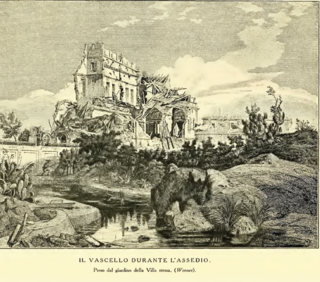
Plautilla Bricci was a 17th-century Roman architect, painter and sculptor; she was the only female architect of her day. Her most famous work is Villa Benedetti near the Porta San Pancrazio, Rome. She also designed the third chapel on the left aisle in the Church of San Luigi dei Francesi, Rome, dedicated to St. Louis, having also painted the altarpiece in this chapel.
Marcello Leopardi (1750–1795) was an Italian painter, depicting both sacred subjects and history in a late-Baroque and early Neoclassic style.
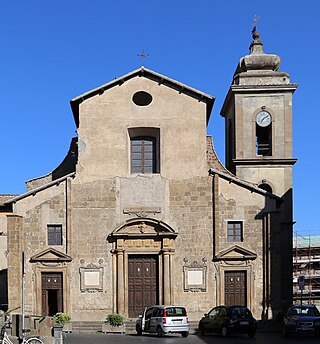
Santi Faustino e Giovita is a refurbished Romanesque-style, Roman Catholic church located on Piazza San Faustino in Viterbo, region of Lazio, Italy. The church is dedicated to the early Christian martyrs, Faustinus and Jovita.